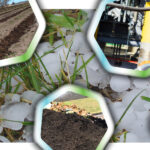
Nora Goldstein
BioCycle October 2017
BioCycle is the Organics Recycling Authority, as our tag line states. After almost six decades of publishing BioCycle, and about five decades of holding BioCycle Conferences, we have earned the title of being the authority on all things organics recycling. Part of what makes BioCycle the authority is collecting and analyzing data on organics recycling in the U.S.
We started with surveying composting infrastructure in the U.S. in the early 1980s (and possibly two decades before, when I was still a kid). But we really cut our data collection teeth with the launch in April 1989 of an annual national survey on municipal solid waste (MSW) generation and disposal practices. Part I of the inaugural survey report, “Where Does The Waste Go?” by Jim Glenn and David Riggle, provided a data baseline for the 250 million tons of MSW collected in 1988, and examined the growing impact of recycling and composting methods.
The second annual survey findings published in March and April of 1990, introduced the title for all subsequent annual reports: The State of Garbage In America. The year-by-year State of Garbage In America reports ended in 2001, after which BioCycle joined forces with Columbia University’s Earth Engineering Center (EEC) to develop a new data reporting methodology based on actual tons of MSW generated, diverted to recycling and composting, disposed and combusted. Four State of Garbage In America surveys were conducted (2004, 2006, 2008 and 2010) utilizing the new methodology.
What started to become apparent during the 2008 state data collection process, and then a reality in 2010, is that fewer and fewer states were collecting and/or compiling data on recycling and composting. Because the BioCycle-EEC methodology is based on actual tonnages, it was no longer feasible to continue conducting what had become a biannual study.
Throughout the decades when State of Garbage In America was taking place, BioCycle also conducted various annual or biannual surveys on composting infrastructure. In 2013-2014, we did the state-by-state data collection for the State Of Composting In The U.S., published by the Institute for Local Self-Reliance. We emailed state organics recycling contacts a one-page questionnaire to gather the data, supplementing it with existing BioCycle data and other sources as necessary. Last December, we decided to conduct a similar national survey, expanding it to composting and anaerobic digestion activities.
Highlights of the findings are in “The State Of Organics Recycling In The U.S.” During the data collection process, we found that fewer states are collecting and/or compiling information on organics recycling projects than in 2014, a trend we found with recycling data during the 2010 State Of Garbage In America data collection process.
Unlike in 2010, however, when BioCycle made the decision to discontinue The State Of Garbage In America, we plan to persist in our state-by-state organics recycling data collection endeavors. The first step is to create and utilize standard definitions for all categories of organics recycling activities. Next, we want to collaborate far and wide to populate BioCycle’s portals — FindAComposter.com, FindADigester.com and FindOrganicsHauler.com. Finally, we will invest the time to work with states on organics recycling data collection strategies.
Why dig so hard for data? It’s not solely to continue our claim as the Organics Recycling Authority. It’s also because we believe that organics recycling is a darn good strategy to manage the consequences of global warming. To make that case, digging for data is essential.









